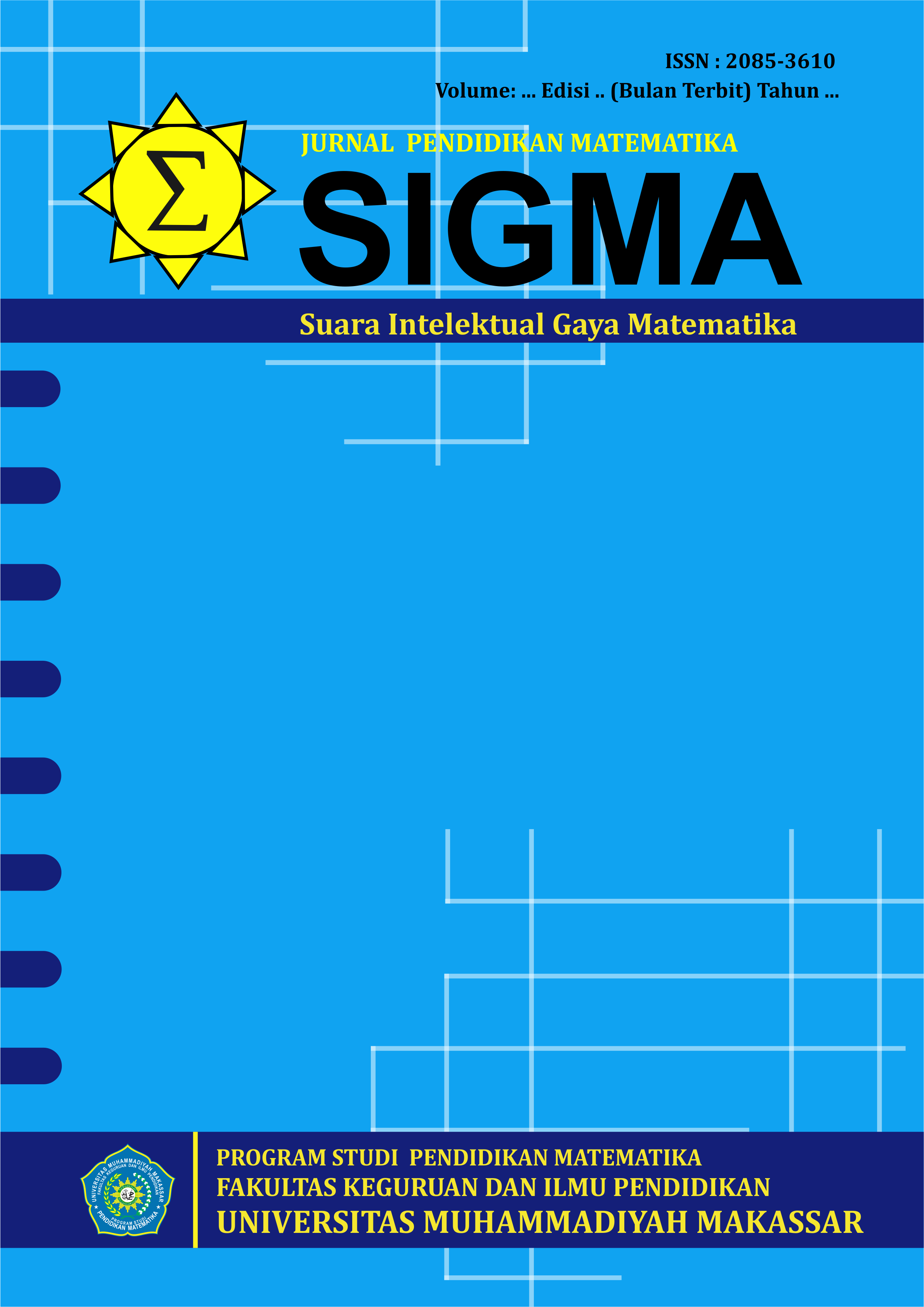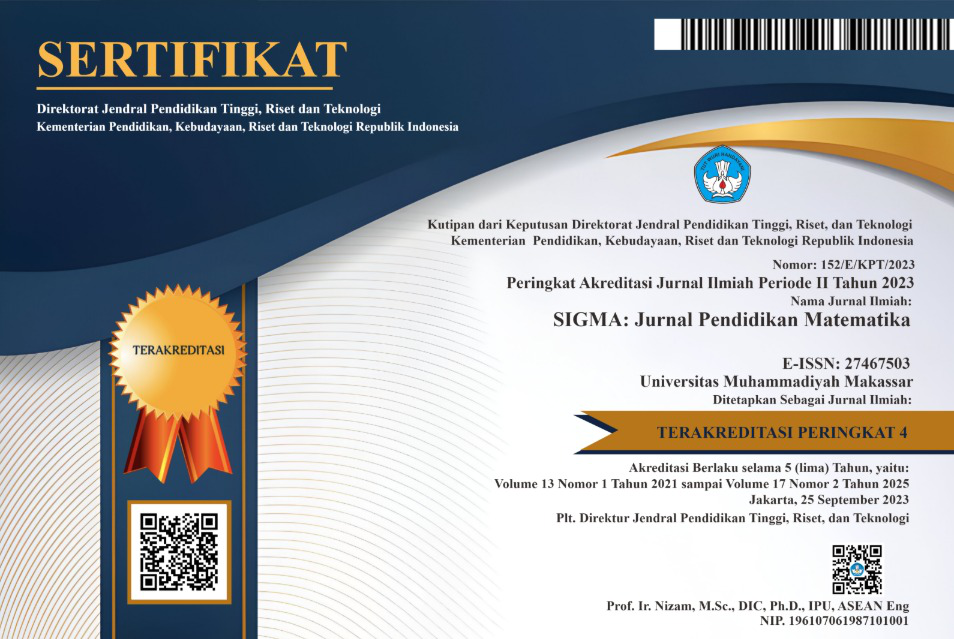EFEKTIVITAS PEMBELAJARAN MATEMATIKA MELALUI PENDEKATAN CONTEXTUAL TEACHING AND LEARNING (CTL) PADA SISWA KELAS VII SMP ISLAM TERPADU AL HIKMAH KABUPATEN PANGKEP
DOI:
https://doi.org/10.26618/sigma.v14i2.9322Keywords:
Experiments and Approaches, Contextual Teaching and Learning (CTL),Abstract
This research is a pre-experimental study involving an experimental class which aims to determine the effectiveness of learning through the Contextual Teaching and Learning (CTL) Approach in learning mathematics in class VII students of Al Hikmah Integrated Islamic Middle School, Pangkep Regency, 2021/2022 academic year. While the effectiveness of learning is viewed from three aspects, namely: the implementation of learning, classical learning completeness, student activity, and student responses. A learning is said to be effective if at least three of the four aspects above are met, provided that aspects of student activity and classical learning mastery are met. Student scores after learning mathematics through the application of the Contextual Teaching and Learning approach have achieved classical mastery. The average positive student activity is 85.7% and 12.5% negative, this indicates that student activity in learning mathematics through the Contextual Teaching and Learning approach can be said to be active. Student responses to learning the Contextual Teaching and Learning approach can be said to be in accordance with the standards set, namely exceeding 75% of students who gave a positive response. Based on the results of descriptive and inferential analysis, it shows that student learning outcomes before learning the Contextual Teaching and Learning approach are smaller than student learning outcomes after learning the Contextual Teaching and Learning approach, thus learning mathematics through the Contextual Teaching and Learning approach is effectively used on the subject of Algebra in class students VII Al Hikmah Integrated Islamic Middle School, Pangkep Regency.References
Cahyo. (2013). Panduan Aplikasi Teori-Teori Belajar Mengajar. Jogjakarta : DIVA Press.
Hasniwati. (2016). Efektivitas Pembelajaran Matematika Melalui Pendekatan Kontekstual Pada Siswa Kelas VIII B.6 SMP Negeri 7 Makassar. Skripsi tidak diterbitkan. Makassar: Universitas Muhammadiyah Makassar
Mardiana.Sitti. 2015. Respon Siswa dalam Proses Belajar Mengajar ( online ), (http://yakinsuccess.blogspot.co.id/2015/04/respon-siswa-dalam-proses- belajar.html), Diakses tanggal 13 Juni 2017.
Nurhidayah DF. Dkk. Penggunaan Kriteria Watson Untuk Menganalisis Kesalahan Siswa Dalam Menyelesaikan Soal Materi Garis Dan Sudut. Jurnal Pembelajaran Matematika Inovatif.
Nursyahidah, F., Saputro, B. A., & Prayitno, M. (2016). Kemampuan Penalaran Matematis Siswa Smp Dalam Belajar Garis Dan Sudut Dengan Geogebra. Suska Journal of Mathematics Education, 2(1), 13. https://doi.org/10.24014/sjme.v2i1.1344
Putri A. Penerapan Pendekatan Kontekstual Dalam Pembelajaran Matematika https://www.kompasiana.com/ayuputri14/5985aa5a76698f3e8b28fba2/
Suryani & Agung. (2012). Strategi Belajar Mengajar. Yogyakarta : Ombak.
Suyadi. (2013). Strategi Pembelajaran Pendidikan Karakter. Bandung : PT Remaja Rosdakarya.
Trianto. 2008. Mendesain Pembelajaran Kontekstual (Contextual Teaching and Learning) di Kelas. Jakarta: Cerdas Pustaka Publisher.
Wahidin, Pantja Nur. 2016. Metodologi penelitian petunjuk praktis bagi mahasiswa”.Unismuh.
Yamin. (2013). Paradigma Baru Pembelajaran. Jakarta : Referensi.
Downloads
Published
Issue
Section
License
With the receipt of the article by the SIGMA: Jurnal Pendidikan Matematika Editorial Board and the decision to be published, then the copyright regarding the article will be diverted to SIGMA: Jurnal Pendidikan Matematika.
Universitas Muhammadiyah Makassar as the publisher of SIGMA: Jurnal Pendidikan Matematika hold the copyright regarding all the published articles in this journal.Universitas Muhammadiyah Makassar has the right to multiply and distribute the article and every author is not allowed to publish the same article that was published in this journal.
The manuscript authentic and copyright statement submission can be downloaded ON THIS FORM.






